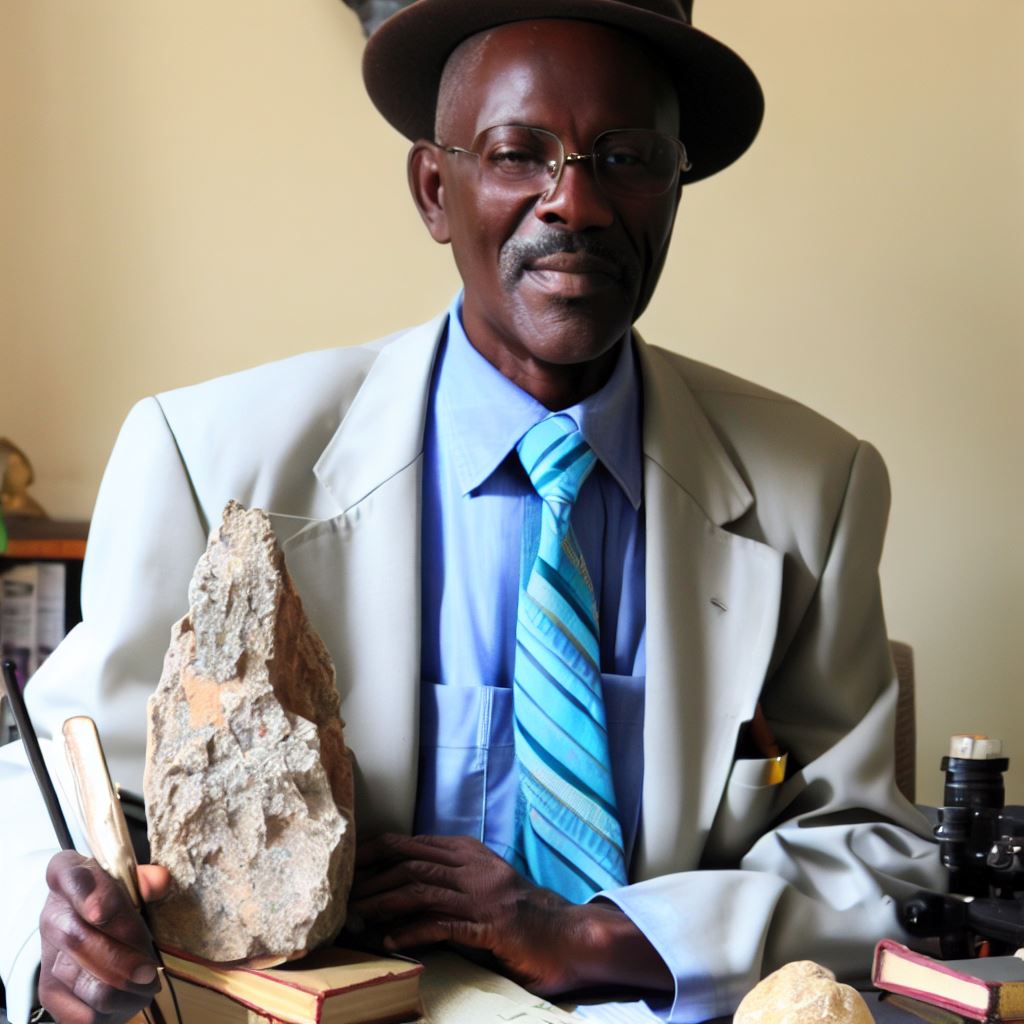Introduction
The geological profession in Nigeria is an essential field that focuses on the study of Earth’s composition and processes. Understanding the future of this profession is crucial for planning and making informed decisions.
Brief overview of the geological profession in Nigeria
Geology is the study of the Earth’s structure, composition, and history. Geologists in Nigeria play a vital role in the development of the country’s natural resources, such as oil, gas, and minerals.
They also work in environmental protection, geotechnical engineering, and disaster management.
Importance of understanding the future of the profession
Understanding the future of the geological profession in Nigeria is important for several reasons.
First, it can help geologists to prepare for the challenges and opportunities that they will face in the future.
Second, it can help educators and policymakers to develop programs and policies that will support the profession in the future.
Third, it can help students to make informed decisions about whether or not to pursue a career in geology.
Current State of Geology in Nigeria
Overview of the current role and significance of geology in the country
Geology plays a critical role in Nigeria’s development, especially in the exploration and exploitation of mineral resources.
It is a multidisciplinary field that involves the study of the Earth’s composition, structure, and history.
With Nigeria’s rich endowment of mineral resources such as oil, natural gas, coal, and solid minerals, geology has become a vital profession in the country.
Geologists contribute significantly to the country’s economy through the identification and extraction of these mineral resources.
They provide valuable information for decision-making in industries such as oil and gas, mining, renewable energy, construction, and environmental management.
Geology also aids in the understanding and mitigation of natural hazards, including earthquakes, landslides, and soil erosion.
Furthermore, geology plays a crucial role in environmental conservation and sustainable development.
Geologists are involved in the monitoring and assessment of environmental impact in extractive industries.
They provide expertise in the management of water resources, soil fertility, and land-use planning.
Geologists also contribute to climate change studies, groundwater management, and geotechnical engineering.
Challenges faced by geologists in Nigeria
- Limited funding and resources: Geologists in Nigeria face significant challenges due to inadequate funding for research, restricting their ability to carry out extensive studies and exploration.
This hampers progress in discovering new mineral deposits and expanding the knowledge base of Nigeria’s geology. - Lack of appreciation and recognition: Despite the crucial role geologists play in Nigeria’s development, their profession is often undervalued and underappreciated.
This can lead to a lack of motivation and limited opportunities for career advancement and professional growth. - Inadequate infrastructure for research and exploration: Nigeria lacks the necessary infrastructure, including well-equipped laboratories and research institutions, to support geologists in their work.
This hampers their ability to conduct in-depth studies, analyze data, and contribute to scientific knowledge and innovation.
The government should prioritize the funding of geological research and ensure the provision of necessary resources.
This includes investing in modern laboratory facilities, research grants, and scholarships for geology students.
Improved funding would enable geologists to conduct extensive fieldwork, collect accurate data, and contribute to the overall understanding of Nigeria’s geology.
Additionally, there is a need for increased awareness and recognition of the importance of geology in Nigeria.
This can be achieved through educational campaigns, public lectures, and collaboration between academia, industry, and government agencies.
Recognizing outstanding geologists and their achievements would also boost appreciation for the profession and attract more young people to pursue careers in geology.
Moreover, the development of adequate infrastructure, such as geophysical and geochemical laboratories, mapping facilities, and research centers, is crucial to supporting geologists’ work.
Public-private partnerships can play a significant role in providing the necessary infrastructure and fostering collaboration between academia, industry, and government.
Geology plays a vital role in Nigeria’s development, but it faces various challenges that hinder its growth and potential contribution.
By addressing issues regarding funding, recognition, and infrastructure, Nigeria can unlock the full potential of its geology profession and ensure a prosperous future for geologists in the country.
Read: Overview: The Petroleum Engineering Profession in Nigeria
Technological Advancements in Geology
Overview of emerging technologies in the field of geology
- Advancements in technology have greatly impacted the field of geology in recent years.
- New technologies have enabled geologists to gather more accurate and detailed data.
- These emerging technologies have revolutionized various aspects of geological research and exploration.
- From remote sensing to data analysis, geologists now have powerful tools at their disposal.
Impact of technology on the future of geology in Nigeria
- Use of remote sensing and GIS in geological studies: Remote sensing and Geographic Information System (GIS) have become invaluable tools in geology.
These technologies allow geologists to gather data remotely using satellite imagery and aerial photographs.
They provide a wide range of information about the Earth’s surface, including geological formations and structures.
In Nigeria, the use of remote sensing and GIS has improved the efficiency and accuracy of geological surveys. - Drone technology and its applications in geology:Drones are another emerging technology that has significant applications in the field of geology.
They can be equipped with various sensors and cameras to capture high-resolution images and collect data.
In Nigeria, drones are being used to map and survey geological features in remote and inaccessible areas.
They provide geologists with detailed information that was previously difficult to obtain. - Advancements in data analysis and interpretation:The advancement in data analysis techniques has revolutionized the way geologists interpret geological data.
Powerful software and algorithms allow for the processing and visualization of complex geological datasets.
Geologists in Nigeria can now analyze large volumes of data more efficiently, leading to better decision-making.
This has been particularly useful in mineral exploration and environmental impact assessments.
Technological advancements have brought about significant changes in the field of geology.
Nigeria, with its rich geological resources, stands to benefit greatly from these emerging technologies.
Remote sensing, GIS, drone technology, and advancements in data analysis have improved the accuracy and efficiency of geological studies.
As technology continues to evolve, geologists in Nigeria will have access to even more advanced tools and techniques.
The future of the geology profession in Nigeria looks promising, with technology playing a vital role in its growth and development.
Read: Using Technology in Geology: Trends in Nigeria
Environmental Concerns and Geology
The importance of geologists in addressing environmental issues
- Geologists play a crucial role in understanding and mitigating the impact of human activities on the environment.
- They monitor and analyze natural processes, such as erosion, landslides, and volcanic activities, which can have detrimental effects on the environment.
- By studying the Earth’s structure and processes, geologists can provide valuable insights into the potential risks and hazards associated with development projects.
- They can help identify suitable locations for waste disposal sites and assess the environmental impact of such activities.
- Geologists also contribute to the assessment and remediation of contaminated sites, ensuring the protection of soil and water resources.
- They are involved in the evaluation of geological hazards, such as earthquakes and tsunamis, which can have significant environmental consequences.
- Geologists play a vital role in providing crucial information and insights needed for sustainable environmental management.
Role of geologists in natural resource management and conservation
- Geologists are instrumental in the exploration and extraction of natural resources, such as oil, gas, minerals, and groundwater.
- They employ various techniques, including mapping, sampling, and geophysical surveys, to identify and evaluate potential resource deposits.
- By understanding the geology of an area, geologists can help optimize resource extraction processes, minimizing environmental impact.
- They also play a key role in assessing the sustainable yield of groundwater resources, ensuring long-term availability for communities and ecosystems.
- Geologists contribute to the development of sustainable mining practices, including the reclamation of land and the mitigation of negative environmental impacts.
- Furthermore, geologists support conservation efforts by identifying and documenting valuable geological features, such as fossils, minerals, and geological formations.
- They provide expertise in the establishment and management of protected areas, preserving unique geological landscapes and biodiversity.
Impact of climate change on the future of geology in Nigeria
- Climate change poses significant challenges and opportunities for the future of geology in Nigeria.
- Geologists are crucial in studying the impact of climate change on the country’s landscapes, water resources, and ecosystems.
- They analyze changes in sea levels, precipitation patterns, and temperature to assess the vulnerability of coastal areas, rivers, and forests.
- Geologists also contribute to the development of strategies to adapt to and mitigate the effects of climate change.
- For example, they can provide insights into the sustainable use of renewable energy sources, such as geothermal or solar energy.
- Additionally, geologists can help identify and assess carbon capture and storage sites, contributing to efforts to reduce greenhouse gas emissions.
- The study of climate change and its geologic implications will be essential for the future of geology in Nigeria.
Geologists will be vital in helping Nigeria prepare for and respond to the geological challenges posed by a changing climate.
Read: Geology Internships in Nigeria: How to Find Opportunities

Economic Opportunities for Geologists in Nigeria
Overview of potential sectors for geologists in the future
- Geologists in Nigeria have a wide range of potential sectors to explore in the future.
- Mining and extractive industries offer lucrative opportunities for geologists to contribute their expertise.
- The construction industry also requires the input of geologists to ensure stable infrastructure development.
- Environmental consultancies and agencies increasingly seek geologists to manage natural resource extraction responsibly.
- Geologists in academia can pave the way for future geologists by teaching and conducting research.
The growth of the mining and extractive industries
- The mining and extractive industries in Nigeria have experienced significant growth in recent years.
- Geologists play a vital role in mineral exploration, discovery, and extraction processes.
- With proper geological surveys and assessments, Nigeria can attract more investments in the sector.
- Geologists can work closely with mining companies to ensure sustainable practices and minimize environmental impact.
- The growth of these industries presents numerous job opportunities for geologists in Nigeria.
Opportunities in oil and gas exploration and production
- Nigeria has vast reserves of oil and gas, offering immense opportunities for geologists.
- Geologists are essential in the exploration and production of oil and gas resources.
- Technological advancements and research allow geologists to discover new oil and gas fields.
- Geological modeling and analysis help optimize drilling and production processes for maximum efficiency.
- Nigeria’s oil and gas industry continues to provide stable employment prospects for geologists.
The future of the geology profession in Nigeria is filled with economic opportunities across various sectors.
Geologists can explore potential sectors like mining, extractive industries, construction, environmental consultancies, and academia.
The growth of mining and extractive industries in Nigeria offers lucrative job prospects for geologists.
With proper geological surveys and assessments, these industries can attract more investments, further opening doors for geologists.
Additionally, the oil and gas sector provides abundant opportunities for geologists to contribute their expertise in exploration, production, and technological advancements.
Overall, geologists in Nigeria have a promising future with numerous avenues for professional and economic growth.
Read: Women in Geology: A Focus on the Profession in Nigeria
Uncover the Details: Nigeria’s Optical Assembly: Past, Present, Future
Education and Training for Future Geologists
Need for quality geology education in Nigeria
Geology education plays a crucial role in shaping the future of the geology profession in Nigeria.
It is essential to provide aspiring geologists with a solid foundation of knowledge and skills to meet the demands of the industry.
Unfortunately, the current state of geology education in Nigeria leaves much to be desired.
Many academic institutions lack the necessary resources and expertise to deliver high-quality education in the field of geology.
This hampers the development of competent geologists who can contribute effectively to the nation’s geological challenges.
Without proper education, aspiring geologists will struggle to grasp the fundamental concepts and practical applications of geology.
This knowledge gap hinders their ability to make significant contributions to the field and address the geological issues faced by Nigeria.
Recommendations for improving geology education in the country
- Enhanced curriculum and practical training: First and foremost, there is a need for an enhanced geology curriculum that aligns with industry requirements and global best practices.
The curriculum should include a robust mix of theoretical knowledge and practical training to equip students with the skills needed to succeed in the field.
Practical training opportunities, such as fieldwork and laboratory exercises, should be an integral part of geology education.
These hands-on experiences will allow students to apply their theoretical knowledge in real-world scenarios and develop essential field skills.
Additionally, incorporating case studies and real-life geological challenges into the curriculum can provide students with a deeper understanding of the complexities involved in the profession. - Collaboration between academic institutions and industry: To bridge the gap between academia and industry, collaboration between academic institutions and the geology industry is crucial.
This collaboration can take various forms, such as internships, guest lectures, and research partnerships.
Industry professionals can share their practical experiences, knowledge, and insights with students, giving them a valuable perspective on the profession.
This interaction can help students understand the industry’s requirements and prepare them for future roles as geologists.
Education and training are pivotal to the future of the geology profession in Nigeria.
The country needs to invest in quality geology education to address the existing deficiencies in the system.
By enhancing the curriculum, providing practical training, and fostering collaboration between academic institutions and industry, Nigeria can produce competent geologists who can contribute effectively to the nation’s geological challenges.
Building a strong foundation of geology education is crucial for shaping the future of the geology profession in Nigeria.
It is an investment that will yield long-term benefits and propel the country towards sustainable geologic development.
Conclusion
The future of the geology profession in Nigeria
The geology profession in Nigeria holds immense promise. Geologists play pivotal roles in resource exploration, environmental conservation, and infrastructure development.
With a growing demand for mineral resources, geologists are poised to lead the charge.
Geological surveys and mapping are vital for sustainable land use planning.
Geologists’ expertise is indispensable in understanding and mitigating natural hazards like landslides and earthquakes.
Importance of adapting to technological advancements and environmental concerns
In Nigeria, adapting to tech advancements and environmental concerns is paramount. Technology enhances efficiency, while environmental protection ensures sustainability.
Nigeria’s burgeoning population demands innovative solutions. Neglecting tech and ecology risks economic stagnation.
Embracing digitalization aids education, healthcare, and commerce accessibility.
Furthermore, green initiatives mitigate climate change and safeguard our resources. Sustainable practices foster job creation and economic growth.
Nigeria’s youth can drive innovation and eco-consciousness. Leveraging renewable energy sources curbs power shortages.
Potential for economic growth and career opportunities in the field
Are you seeking dynamic career options? Look no further,Emerging industries offer boundless prospects, renewable, energy, and healthcare are booming embrace change. Tech giants like Amazon, Google, and Tesla lead the innovation race.
Renewable energy’s rapid ascent fuels green careers solar, wind, and electric vehicles surge ahead.
Join the green revolution. Secure your eco-conscious career.
Healthcare, always essential, grows even more. Telemedicine, biotech, and AI reshape the sector.
Dive into healthcare, heal lives, and build your future.




